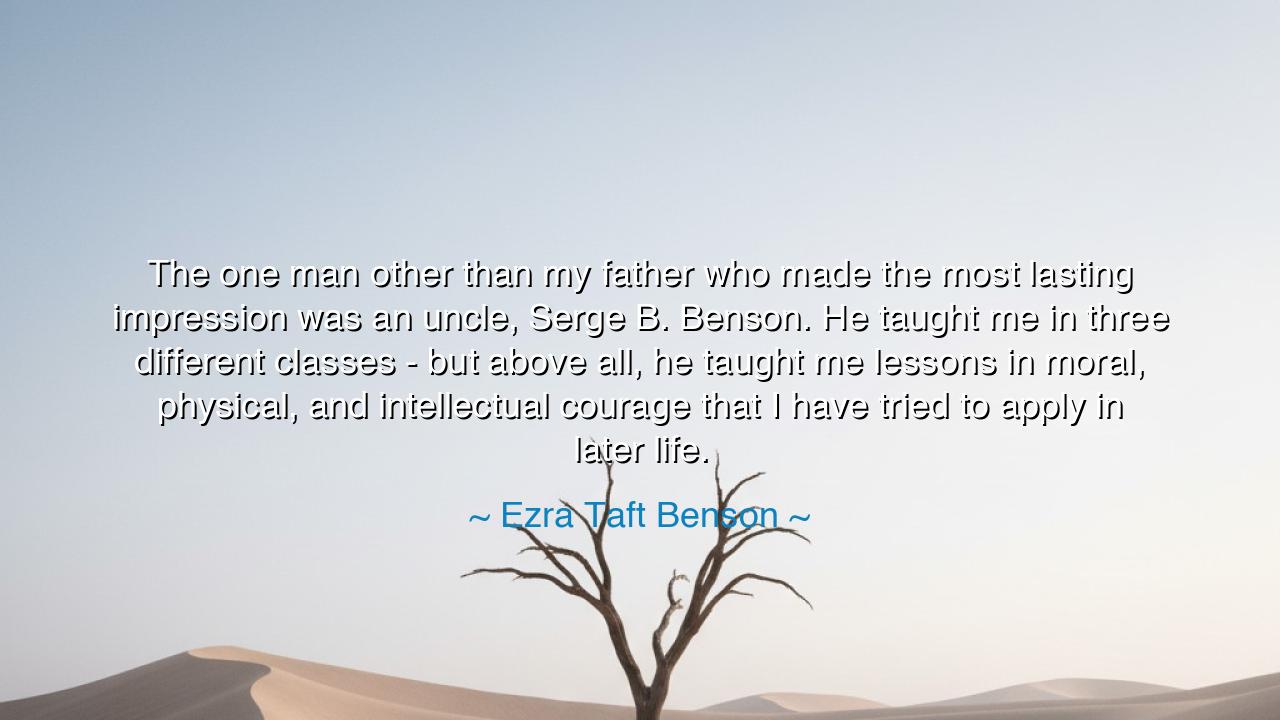
The one man other than my father who made the most lasting
The one man other than my father who made the most lasting impression was an uncle, Serge B. Benson. He taught me in three different classes - but above all, he taught me lessons in moral, physical, and intellectual courage that I have tried to apply in later life.






“The one man other than my father who made the most lasting impression was an uncle, Serge B. Benson. He taught me in three different classes — but above all, he taught me lessons in moral, physical, and intellectual courage that I have tried to apply in later life.” — thus spoke Ezra Taft Benson, a man of faith, leadership, and conviction, whose words echo the eternal truth that true greatness is not inherited from titles or wealth, but learned from the example of the courageous. In this reflection, Benson pays tribute to the unseen architects of the soul — the mentors who shape character, ignite purpose, and awaken courage. His uncle, Serge B. Benson, was not merely a teacher in the classroom, but a teacher in life, whose influence planted within the young Ezra a seed of fortitude that would one day blossom into the strength of a leader.
The origin of this quote lies in Ezra Taft Benson’s recollection of his youth — a time of discipline, study, and moral awakening. Raised in the humble fields of Idaho, Benson would later rise to become a statesman, religious leader, and President of The Church of Jesus Christ of Latter-day Saints. Yet, in his rise, he never forgot the men who formed the pillars of his character. His father gave him roots; his uncle gave him direction. It was Serge Benson who taught him that knowledge alone is not enough — it must be united with moral courage, physical endurance, and intellectual honesty. These three forms of courage, Benson suggests, are the triune forces that uphold a life of integrity.
Let us first understand moral courage — the strength to do what is right when fear or convenience whispers otherwise. This courage stands taller than all others, for it demands not muscle, but conscience. It is the voice that refuses to bend to corruption, the spirit that speaks truth even when silence is safer. History is filled with its heroes: Socrates, who drank the hemlock rather than betray his philosophy; Rosa Parks, who remained seated and thereby moved a nation; and Dietrich Bonhoeffer, who defied tyranny in the name of faith. Their courage was moral — born not of violence, but of principle. So too did Serge Benson, through quiet example, teach his nephew that the noblest strength is the strength to stand alone when right demands it.
Next comes physical courage — the bravery to act when the body trembles, to endure hardship, pain, and fatigue for a greater cause. Ezra Benson was a man of the land before he was a man of letters, and his uncle’s lessons would have been forged in labor and toil. To work, to strive, to confront storms both literal and symbolic — this too is courage. For every moral truth must be carried into the world by hands willing to labor and bodies willing to endure. The ancient Spartans taught their youth that courage was not the absence of fear, but the mastery of it. So must every man and woman learn that to be steadfast in body is to prepare the soul for higher trials.
Lastly, there is intellectual courage — the rarest of the three. It is the courage to think freely, to question deeply, to pursue truth even when it unsettles comfort. It demands humility and strength alike, for to confront one’s ignorance is no small battle. The prophets, the philosophers, the scientists — all have known this courage. Galileo faced the wrath of the powerful for daring to say that the Earth moved; Abraham Lincoln faced a nation divided when he declared freedom for the enslaved. In the classroom of life, Serge Benson must have shown young Ezra that to think rightly is to live rightly — that truth, once seen, must be honored even at great cost.
Ezra Taft Benson’s tribute, therefore, is more than a memory — it is a teaching in itself. He reminds us that the greatest mentors do not simply fill the mind with knowledge; they awaken the spirit with example. His uncle’s lessons were not confined to lectures or books, but lived daily in word and deed. Such teaching leaves an imprint deeper than time — for when one soul teaches another how to be courageous, that wisdom multiplies across generations.
So, my children, take this to heart: seek teachers who awaken courage, not comfort. Let your moral courage defend truth, your physical courage endure hardship, and your intellectual courage pursue wisdom. Do not mistake ease for peace or silence for virtue. True peace is born of integrity, and true virtue demands endurance. The world is not moved by the timid mind or the fragile heart, but by those who, like Serge B. Benson, live with conviction and teach others to do the same.
And thus, as Ezra Taft Benson testifies, one person’s example can shape another’s destiny. The courage you learn and live today may become the foundation for someone else’s tomorrow. Live, then, as both student and teacher of moral, physical, and intellectual courage — for in doing so, you will not only honor those who taught you, but you will become a light to those who follow.






AAdministratorAdministrator
Welcome, honored guests. Please leave a comment, we will respond soon